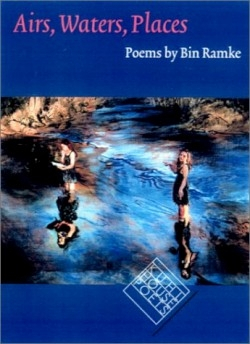Airs, Waters, Places
“[S]tars fall sometimes and / there you are / up to your knees in light,” writes Cole Swensen - an image for Epiphany, the day the infant Christ was first beheld by the Magi. “I thought / my horse would bolt, but, / though blinded, he did not, but / (and not a mark on him) stood / calmly eating the burning grass.” Heaven’s light and its searing earthly consequences might be metaphor for what happens when an artist’s vision connects with a ready audience, when poetry (counter to Auden’s famous assertion) makes something happen, rather than settles for entertaining. Poems that create music, interact with readers, and remain a goad in the conscience, generating reflection well after they are read, are what eventually accrue to us as the literature of an age.
The historic stone building known as Kuhl House, home of the University of Iowa Press, lends its name to a series of forward-looking books of poetry edited by Jorie Graham and Mark Levine that attempts to chart a course for poetic literature in the new century. Now Boylston Professor of Oratory and Rhetoric at Harvard, Graham was for many years a professor of poetry at the Iowa Writers’ Workshop, where Levine both graduated and currently teaches. The first three books they have selected demonstrate the series’ stated intention of highlighting inventive and occasionally provocative lyric voices.
Ramke, an author with two previous books from Iowa, brings a range of interests-scientific, environmental, historical-to bear on his meditative examination of fleeting nature and Eros, of transient language and literature. In Airs, Waters, Places, he follows his swirl of questions as it expands from an initial observation, as in “Watery”: “is a river the water? / full or perhaps empty if / a river is empty is there a river? / is it agony to die / a fish down the gullet of a heron? / is a heron beautiful? is / the heron part of the river?”
Ramke makes liberal use of collage techniques, introducing lines and stanzas from centuries of writings literary, philosophical, and scientific, along with news items and snippets from the Internet. In “Moths and the Occasional Dog,” he hints at what might be his aesthetic:
I love Rilke because German is not English but almost
and I hide again and again in translations each
an obvious failure each providing room for me, Reader.
Such room is provided by these poems in their successes.
The Tres Riches Heures du Duc de Berry is an elaborately illustrated fifteenth-century book of days, a devotional text whose calendar illustrations Swensen used as a beginning point for the poems in Such Rich Hour. Swensen was the 1998 Winner of the Iowa Poetry Prize with Try, and this volume splendidly extends the linguistic adventuresomeness of the previous work. Drawing upon the extreme changes in fifteenth-century France (which began with the plague and ended with the development of technologies of printing and timekeeping), these poems explore the connections between the arts and the social and political doings of those years. They sometimes propel the reader through the shape-changing exercise of translation, as in her “Prologue”:
“You
(toi aussi)
that death is an angle with grey eyes
I read it somewhere;
therefore,
come true.
(if you only) le least idee of that qui doit arriver
(mon âme)
it is said
it is sown though there is no
reason, particularly,
that it had to happen/will happen (circle one) this way.
Poems memorialize saint’s days, events of wartime, discoveries, and inventions. Swensen’s “Introduction” states that the many factual references in the poems “do not require a run to the encyclopedia,” but she also presents an extensive and fascinating list of sources.
Where Ramke’s and Swensen’s poems require the reader to interact as “translator,” Emily Wilson’s poems lure the reader sensually and imagistically with a halting rhythm and lush vocabulary. A 1999 Iowa Writer’s Workshop graduate, Wilson creates moody, highly sonic poems such as this section from “Girl in Me,” part of the “Eve Pieces” that close the book: “The moon’s old feints at umbrage, the live / oaks cant and hinge to river’s edge / and all loose things damnable in their tracks. / And was I lost to the bosks too long for pardon?”
Wilson renders nature and the man-made with similar music:
Snow founders under
us the imbricate
aspen out-shudder and then
the sifting down we do
not fault ourselves
apart I know
you scarce as the seam
between two fields from
just this
far a jet raveling
A debut with three such strong titles is a fortunate harbinger for Iowa’s new series, and a welcome sign that University presses continue to maintain a healthy investment in the development of American poetry.
Disclosure: This article is not an endorsement, but a review. The publisher of this book provided free copies of the book to have their book reviewed by a professional reviewer. No fee was paid by the publisher for this review. Foreword Reviews only recommends books that we love. Foreword Magazine, Inc. is disclosing this in accordance with the Federal Trade Commission’s 16 CFR, Part 255.

